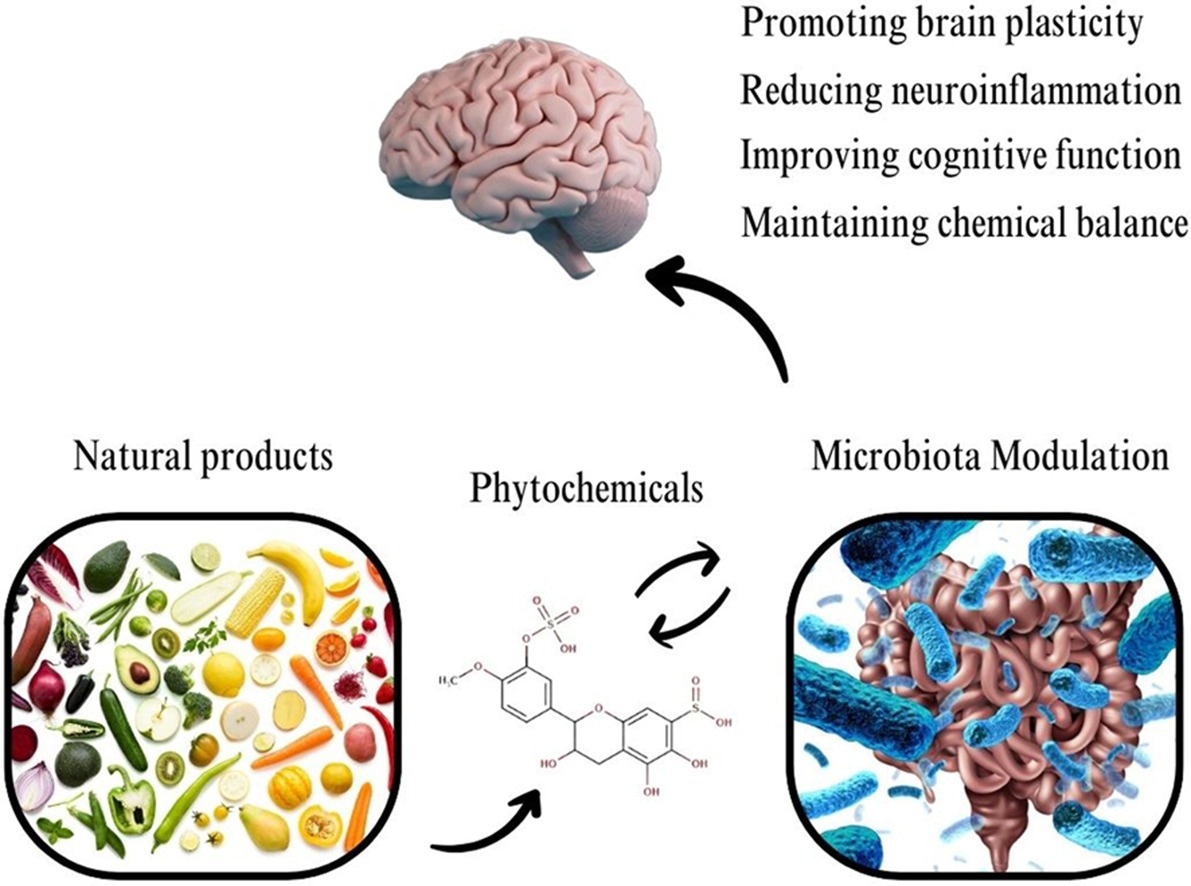The enteric and central (CNS) nervous systems communicate through the GBA, which involves neurological, immunological, and hormonal mechanisms. Recent reports suggest that changes in the gut microbiota and microbial metabolite synthesis are associated with neurological disorders, such as anxiety, autism spectrum disorder, depression, migraine, multiple sclerosis, and Parkinson's disease.
Phytochemicals exert regulatory effects on the GBA and can interact with the immune system, neurotransmitter systems, and gut microbiota, influencing brain function. A growing body of evidence suggests that phytochemicals could be a promising therapeutic strategy for neurological conditions. The present study discussed phytochemicals' potential therapeutic implications and limitations on the GBA in neurological disorders.

Study: Modulatory effects of phytochemicals on gut-brain axis: therapeutic implication.
Phytochemicals, GBA, and neurodegenerative diseases
Dietary polyphenols, such as curcumin, coumarins, cinnamic acid, lignans, and flavonoids, modulate the gut microbiota and exhibit improved blood-brain barrier (BBB) permeability. While the efficacy of polyphenols as antioxidants has been unclear due to conflicting evidence on their bioavailability, recent studies suggest they can still exert effects through gut microbiota-induced chemical modifications.
Gut microbiota enzymes modify polyphenols by adding hydroxyl groups and removing sugar and methyl groups, leading to smaller compounds with improved intestinal absorption. Further, curcumin exhibits anticancer, anti-inflammatory, and antioxidant properties. However, its pharmacological benefits are limited by its chemical instability, low water solubility, poor bioavailability, and rapid metabolism.
Notwithstanding, it is speculated that curcumin exerts indirect effects on the CNS. Metabolites derived from curcumin modification by microbial enzymes are more pharmacologically active and may help restore dysbiosis. Besides, gut bacteria metabolize flavan-3-ols and produce arylvaleric acid and aryl-γ-valerolactone derivatives, which have been shown to protect against Alzheimer's disease (AD) in mouse models.
Valerolactones break down into secondary phenolic or polyphenolic metabolites that are readily absorbed and cross the BBB more easily than dietary flavonoids. Ellagitannins found in raspberries, walnuts, and pomegranates have several biological activities but have limited bioavailability. However, urolithins, the ellagitannin metabolites synthesized by the gut microbiota, are more easily absorbed and likely responsible for the known beneficial effects of ellagitannins.
Effects of apigenin and quercetin
Apigenin is a pharmacologically active plant flavone used to treat different diseases. A study reported that a three-month apigenin treatment in mice with AD had improved memory retention and learning deficits. Further, treatment positively affected amyloid precursor protein processing and reduced amyloid-beta (Aβ) accumulation.
Further, quercetin is a flavonoid with anti-inflammatory and antioxidant properties but has poor oral bioavailability. To overcome this, quercetin nanoparticles have been developed, and a two-month oral treatment with these nanoparticles resulted in significant improvements in memory impairment and cognition in AD mice.
Additionally, treatment reduced glial fibrillary acidic protein expression. Quercetin-3-O-glucuronide reduced tau phosphorylation and Aβ accumulation and improved cognitive function in AD-like mice. Besides, epigallocatechin-3-gallate, a green tea polyphenol, was reported to have a positive effect on memory and learning deficits in AD mice.
Effects of resveratrol and ginsenoside Rg1
Treatment with ginsenoside Rg1, the active component of ginseng, was shown to reduce the loss of dopamine neurons, behavior effects, and abnormal structural changes in the substantia nigra pars compacta. Resveratrol is a natural polyphenol with anti-inflammatory and anti-aging properties that can counteract stress. Studies have illustrated its impact on metabolic and CNS disorders, including obesity, dementia, depression, and diabetes.
Resveratrol can regulate the balance between the gut and brain through the glucagon-like peptide (GLP)-1 pathway and influence microbiota diversity. In a mouse model of irritable bowel syndrome, resveratrol treatment before chronic acute combining stress caused improvements in anxiety and depressive behaviors, visceral hypersensitivity, and intestinal motility, attributable to the differential regulation of 5-hydroxytryptamine in the intestine and brain.
Concluding remarks
Together, the study summarized the therapeutic implications of phytochemicals on the GBA in neurological disorders. Phytochemicals can influence brain function and reduce neurological symptoms by modulating the gut microbiota composition and function. Nevertheless, phytochemicals vary in composition based on plant species, growth conditions, and processing techniques.
As such, this may impact the comparability and consistency of findings across studies. In addition, responses to phytochemicals and their GBA effects exhibit inter-individual differences due to environmental, lifestyle, and genetic factors. Therefore, further research is warranted to comprehensively understand the optimal usage of phytochemicals for treating neurological conditions.